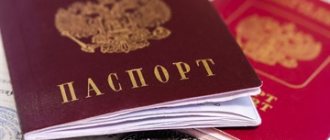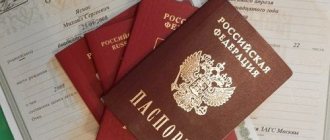According to the law of the Russian Federation, every citizen must have registration at the place of residence.
This also applies to minor children.
From the very birth of a child, parents are obliged to register him in their living space.
But sometimes this becomes impossible due to certain circumstances.
Then the question often arises: is it possible to register a minor with his grandmother?
…
Legislative acts
Issues of registration and deregistration in Russia are regulated by one of the basic legislative acts - the Civil Code.
According to Article 20 of the Civil Code of the Russian Federation:
- the child must live in the living space where his parents are registered;
- if the child does not have parents - in the guardian’s area;
- if the mother is registered at one address, and the father at another, then their son or daughter can live in one apartment or in another, but only if both parents have given their consent to this;
- when both the mother and father do not have registration, according to the Civil Code, the child can be registered with the grandmother. But there are many nuances here.
Can a grandmother register an adult grandson in her privatized apartment?
If the apartment is privatized, then she can give it to her grandson. Or make a will. But in the event of the death of the grandmother, in addition to the heir under the will, a disabled heir may receive a share according to the law. Let’s say her son or daughter is retired.
If the grandmother wants to transfer the apartment to her grandson, then she can give it to him. To do this, it is necessary to draw up a gift agreement and register the transfer of ownership in Rosreestr. Another option that is possible is to bequeath the apartment to your grandson. In this case, inheritance by law does not occur, but inheritance by will occurs. True, in this case there may be faces. having the right to an obligatory share in the inheritance (Article 1149 of the Civil Code of the Russian Federation), who inherit regardless of the contents of the will.
This is interesting: In what cases can the bailiff not enter the debtor’s apartment?
Restrictions on registration
If a close relative is the sole owner of the apartment, then it is enough to conclude an agreement with him that one of the parents is registered in the living space together with the child. This is a mandatory condition, since the Civil Code obliges parents (at least one) to be registered with the child . But this only applies to children under fourteen years of age.
If a minor citizen has already turned fourteen and has expressed a desire to register in his grandmother’s apartment, he can do this without his parents.
IMPORTANT! If there are several homeowners, then everything is a little more complicated, since the consent of all owners will be required.
Another way to register a child in the grandmother’s apartment without registering the parents is for the grandmother to register as a guardian.
How to register a grandson
Collect documents such as a personal passport, the passport of the child’s mother or father and the child’s passport (if available) or his birth certificate, the child’s discharge (departure) form from the previous place of registration, a certificate from the parents’ place of residence or two certificates, if they are registered separately, a house book, a registration certificate for an apartment, an extract from the BTI confirming the ownership of a residential premises or a purchase and sale agreement and their photocopies, parental permission for registration, certified by a notary, as well as documents confirming the fact that the child lives with you ( for example, a student card if the child attends an educational institution in your locality, etc.). Attention! If the child is already 14 years old at the time of registration, it is also necessary to provide a military ID or a certificate issued to those liable for military service.
According to the housing legislation of the Russian Federation, the owner of a home can move (register) his children, grandchildren, and other relatives into the territory of his living space only with the consent of all people living (registered) in this residential premises, even those who are absent at the time of registration. If, in fact, the grandson lives with his grandparents, and the mother is not against registering him in the old people’s home, then you can register the child without any problems, and for this you need to collect the necessary documents and submit them to the territorial body of the Federal Migration Service.
This is interesting: Law on Silence in the Republic of Bashkortostan
How to register a child with his grandmother?
What documents are needed?
In order to register a minor at the place of residence of the grandmother, you will need a package of documents including:
- Birth certificate of the person being registered.
- Passports or other documents confirming the identity of the parents.
- A written statement containing a request to register a minor in the grandmother's apartment. It must be written by one of the parents.
- Written consent of the second parent.
- An agreement fixing the registration of the mother or father together with the child. This is a regular agreement on the free use of residential premises, but it must involve the registration of a representative along with a minor citizen.
- A document confirming the owner's right to own the apartment.
ATTENTION! Each case is individual and sometimes additional paperwork may be required. Therefore, in the process of creating a package of documents, you should take into account all the specifics of your personal situation.
Registration stages
When all the papers have been collected, further actions can be divided into five successive stages.
So, you will need:
- Contact the local authorities involved in registering citizens (house management, Federal Migration Service).
- Find out the full list of documents that will be required and collect the missing ones. It is at this stage that it will become clear whether any additional documents are needed in addition to those listed above.
- Conclude all necessary agreements and have documents certified by a notary.
- At the passport office, write an application for registration at the place of residence (form number 6).
- Obtain official permission to register the child in the form of a stamp on the birth certificate.
Without parents
It is possible to register a child without at least one parent only if he is already fourteen years old.
At this age, the law allows a citizen to enter into an agreement on the free use of living space. Until the age of fourteen, the law obliges a child to live with his parents.
There is only one way to register a child under fourteen years of age without a parent - if the grandmother takes guardianship of her grandson , since the law allows a child to live with a guardian if he does not have parents.
What documents are needed to register children with close relatives?
Registration of a child in a privatized apartment requires the following eligibility documents:
- birth certificates;
- civil passport of the grandmother and mother/father of the baby;
- an application certified by a notary from either parent to register the child in the grandmother’s apartment together with the parent;
- confirmation from the place of registration of the parents (taken from the Federal Migration Service at the place of registration);
- a certificate from the building management or house register about the registration of the responsible owner and technical passport for the apartment;
- a sheet of the child’s departure from the previous place of registration (if there was one);
- 1st copy of the agreement “On the provision of residential premises until the child reaches adulthood.”
This is interesting: How to attach a child to a children's clinic: at the place of registration, not at the place of residence
Registration of a child in municipal housing requires the availability of the above-mentioned eligibility documents plus:
- certificates about the status of the grandmother’s personal account;
- certificates of relationship (taken from the registry office);
- extracts from the house register;
- consent to register the child in the specified premises from all those registered in this living space, plus all of the above documents.
If your grandmother changed her last name, be sure to attach a divorce document to the marriage certificate. Originals are submitted along with photocopies.
Check the full list of documents at the passport office or the Federal Migration Service and no matter how many are determined for each square meter, a child under the age of 14 will be registered in any case.
You can register a small grandson or granddaughter in your apartment even when permanent or temporary guardianship has been issued to the grandmother. After registering guardianship, contact the Federal Migration Service at your place of residence.
Registration in a municipal apartment
Registration in a non-privatized apartment has some peculiarities.
What documents are needed?
In addition to the standard package of documents, the following will be required:
- If there are still minor citizens registered in the living space, it is necessary to obtain written consent from them to register a new tenant. This may cause problems if you plan to register several grandchildren at once.
- Papers that can confirm the family relationship between the owner of the property and the minor citizen whom she is going to register.
- Extract from the house register.
Procedure
The stages of registration in municipal housing are no different from a similar procedure with privatized housing (if you do not take into account the receipt of additional documents). But a municipal apartment has some features and nuances compared to a privatized one.
Differences from registration in a privatized apartment
The main feature of non-privatized living space is the absence of a single owner.
If the owner can register anyone in privatized housing at will, then in municipal housing other residents may oppose this.
Another significant difference is the need to document the right to register a minor in municipal housing .
It can take quite a lot of time to collect the necessary papers.
Registration in the apartment
Registration in an apartment is one of the issues that people don’t think about until the issue begins to worry them seriously. There can be many reasons for changing your place of registration: due to a change in city of residence, marriage registration, etc.
Registration in a privatized apartment
Registration in a privatized apartment is carried out by the housing department, management company or HOA. To register, you must contact a passport officer with the necessary documents. The specified body, within three days, registers the citizen at the place of registration and puts a corresponding mark in the passport. Registration is absolutely free and does not require payment of additional fees.
It is worth noting the fact that registration in the owner’s apartment requires the consent of the apartment owner. If there are several owners, then the consent of all of them is required.
Recently, cases of selling minimal – for example 1/100 – shares of apartments for registration have become common. Legally, this option of registration is possible, but de facto it is unlikely. An honest passport officer would refuse registration for such a small living space.
Registration of a child (newborn) in a privatized apartment, just like in a municipal one, does not require the consent of the owner. All that is required is to submit documents to the registration authority - clause 80 of FMS Order No. 208
Registration in a non-privatized apartment
To register in a non-privatized apartment (under a social tenancy agreement), you must, in the same way as in the case of privatized living space, contact the registration authority with the established set of documents: a passport, a certificate of departure from the previous place of registration, as well as a military ID - for persons of military age and those liable for military service.
Registration in a municipal apartment is carried out with the consent of all persons registered there. When registering a newborn, consent is not required.
Separately, it is worth mentioning that in order to register persons who are not relatives of citizens registered in a non-privatized apartment, the consent of the landlord is required, since registration in such an apartment gives the registered person the right of ownership of the housing.
Temporary registration in an apartment
According to current legislation, temporary registration does not provide a person with ownership rights to housing. Registration of temporary registration is less problematic from a legal point of view, however, it involves some restrictions on what is temporarily prescribed in the rights. The registration of temporary registration must be carried out by the owner of the residential premises.
One of the varieties, so to speak, of temporary registration is registration in a service apartment.
Such registration can be called temporary because a person has the right to live in a service apartment only as long as his employment contract with the employer (owner of the residential premises) is valid.
As soon as the employment relationship ends, the person is obliged to move out of the occupied living space. Registration in a service apartment is carried out only with the consent of the apartment owner.
Registration in a communal apartment
Anyone wishing to register in a communal apartment should know that registration is carried out in a room that has a very specific owner. The common areas in a “communal apartment” are a corridor, a kitchen and a bathroom, and not a room. That is, registration in a communal apartment requires the consent of only the owner of the room, but not the neighbors.
Registration in a mortgaged apartment
Registration in a mortgaged apartment is a rather controversial issue.
The thing is that some municipalities issue their own regulations prohibiting registration in a mortgaged apartment or requiring the consent of the rent holder for this.
At the same time, federal legislation does not contain such references. That is, the refusal to register a mortgaged apartment can be appealed in court.
Recently, banks have clearly indicated the conditions of registration in mortgage agreements, so the analysis of each specific case must be approached on an individual basis.
Quite a long time ago, the institution of registration was declared unconstitutional. But instead they now continue to require registration at the place of residence. Without it, it can be difficult to interact with government agencies. In legislation... Registration of real estate properties that are the subject of a mortgage provokes endless rhetoric among citizens. Regulatory acts at the federal level poorly cover this topic, which is used by financial institutions... Today, the term “registration” is no longer valid, although it is still very often used in informal communication. In fact, this word now denotes permanent or temporary registration of persons... An agreement for the free use of residential premises is a special legal act that allows for the implementation of the procedure for registration of citizens in apartments and private houses. The contract is drawn up by m... Deregistration is carried out at the initiative of citizens. This procedure may involve both municipal and private housing. Experts say that citizens are being encouraged to deregister...
07/01/2019 — Nadezhda Belousova
Hello, how can I get advice on registering a mother of many children in a 1-room apartment?
The question was answered over the phone.
Source: https://www.gilkod.ru/article/kvartirnyj_vopros/propiska_v_kvartire.html
Mother's rights
If the child is registered in the grandmother's apartment, the mother's rights do not change. Guardianship and registration are two different things, so you should not be afraid that the minor’s place of residence will somehow affect the mother’s legal rights. Also, the registration of a son or daughter does not give the mother the right to live at this address . Such rights can only be given by a contract concluded with the owner.
Registration of a minor citizen is not the easiest procedure, even if it is expected to live together with a close relative - a grandmother. But it is quite feasible. So, if there is such a need to register a child with the grandmother, the law provides for all the mandatory procedures and rights of the parties.









